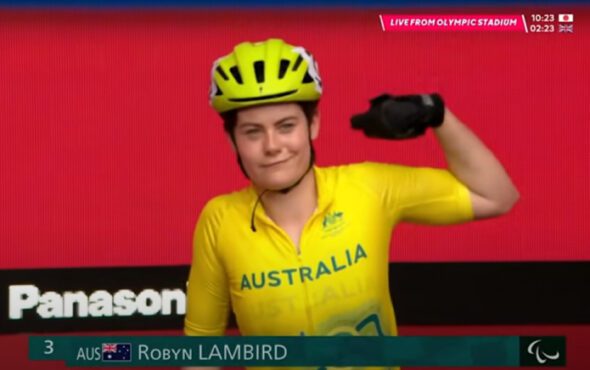
Robyn Lambird has made history by becoming the first out non-binary athlete to win a medal at the Paralympics.
The 24-year-old’s 18.68 seconds score saw them win bronze in the Women’s 100-metre T34 sprint on 29 August.
In first place was Britain’s Hannah Cockroft with a time of 16.39 seconds and in second was Kare Adenegan, another British athlete, at 17.03 seconds.
During the medal ceremony, Lambird jokingly attempted to grab Cockroft’s first place prize before happily draping their bronze medal around their neck.
The 24-year-old said: “It is my first [Paralympic] Games, it’s been almost a 10-year dream so to be here and to win a medal among the best in the world… It’s awesome.
“I just want to show all the kids out there – with disabilities or not – if you have a dream, chase it.
“There’s always a way and you can find that way.”
Lambird has been living with cerebral palsy since they were nine-years-old and outside of racing they are a model and advocate for disability rights.
Earlier this month, the Australian athlete explained that they have been “training hard for the past six years” so they could take home a medal at Tokyo’s Games.
New Zealand’s Laurel Hubbard made history earlier this month by becoming the first out trans athlete to compete in Olympic history.
View this post on Instagram
This year’s Paralympics will see a record number of LGBTQ+ athletes competing, with at least 34 confirmed out athletes taking part so far – more than double the number who competed in Rio.
Although the figure is by no means definitive as there are likely more Paralympians who are not yet out to the public, there are at least a dozen sports and eight countries represented by LGBTQ+ athletes this year.
In Rio’s 2016 Paralympic Games, there were 12 athletes competing – making this figure a new record when it comes to representation.
It comes after a record-setting Tokyo Summer Games, which saw at least 185 LGBTQ+ Olympians compete (triple the number of those at Rio).
In a statement, Lauren Appelbaum of RespectAbility, a nonprofit that works to change how society views people with disabilities, said: “We hope that even more out athletes participate in the future, as it is critical for all disabled people to have positive role models for success.”
8/ .@Robyn_lambird of Australia’s track & field team took bronze in the women’s 100m – T34. Robyn is also the first publicly out non-binary athlete to win a Paralympics medal!
— Human Rights Campaign (@HRC) August 30, 2021



